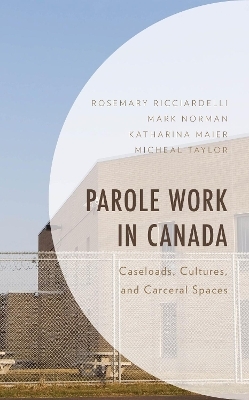
Parole Work in Canada
Rowman & Littlefield (Verlag)
978-1-5381-7975-8 (ISBN)
There are over 1,300 parole officers (POs) employed in Canada’s federal correctional system by the Correctional Service of Canada (CSC). There are two categories of parole officers within CSC: Institutional Parole Officers (IPOs), who work in correctional institutions and are responsible for preparing prisoners for release into the community; and Community Parole Officers (CPOs), who work in the community supervising and assisting criminalized persons. Despite their different occupational duties, both IPOs and CPOs play a significant role in the potential rehabilitation and desistance of former prisoners (USJE, 2019). A recent survey (commissioned by the USJE) found that parole officers face a range of occupational challenges, many of which have been exacerbated by budgetary and policy shifts in recent years. These challenges include heightened risk of burnout due to increased workloads, a lack of support and resources required to effectively perform the job, and an organizational “culture of fear” and harassment in the CSC, all of which contribute to mental health challenges for POs (USJE, 2019). The nature of their jobs expose parole officers, both those in the community and those in institutions, to a variety of potential stresses and potentially psychologically traumatic events (PPTEs), however little academic research has been conducted about the exact experiences of IPOs and CPOs – including how they are exposed to PPTE and the forms in which PPTE manifests. Despite their significant public safety role and potential exposure to occupational stress and PPTEs, IPOs and CPOs are understudied groups with regards to mental health and well-being, particularly in Canada. Results from this project will advance the scholarly knowledge on an understudied sub-population of public safety personnel and provide evidence-based recommendations for meeting the mental health needs of Canadian parole officers, specifically, and correctional workers, broadly.
Rosemary Ricciardelli is professor (PhD) in the School of Maritime Studies and Research Chair in Safety, Security, and Wellness, at Memorial University of Newfoundland's Fisheries and Maritime Institute. Elected to the Royal Society of Canada, her research centers on evolving understandings of gender, vulnerabilities, risk, and experiences and issues within different facets of the criminal justice system. Mark Norman is a postdoctoral fellow at Memorial University whose research interests lie at the intersections of criminology, sociology, and health studies. Katharine Maier is associate professor of criminal justice at the University of Winnipeg. She is interested in examining issues around punishment and penal governance, prisoner re-entry and penal supervision, policing, urban poverty and social marginality, and the work of front-line penal actors. Micheal P. Taylor is qualifying for his PhD while researching responsivity and organizational learning in the Ocean and Public Safety Laboratory at Memorial University of Newfoundland’s Fisheries and Maritime Institute. He is informed by his provincial practice, from 2016-2022, when he worked as a probation and parole officer.
| Erscheinungsdatum | 13.09.2024 |
|---|---|
| Verlagsort | Lanham, MD |
| Sprache | englisch |
| Maße | 161 x 236 mm |
| Gewicht | 476 g |
| Themenwelt | Recht / Steuern ► Strafrecht ► Kriminologie |
| ISBN-10 | 1-5381-7975-X / 153817975X |
| ISBN-13 | 978-1-5381-7975-8 / 9781538179758 |
| Zustand | Neuware |
| Haben Sie eine Frage zum Produkt? |
aus dem Bereich


